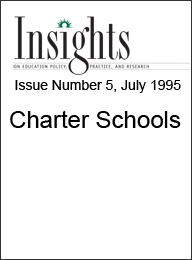Defining Charter Schools
In contrast to traditional public schools, charter schools operate under a contract that is negotiated between a group of school organizers and a sponsoring body. Organizers can be almost anybody-parents, teachers, community members, university officials, or business leaders. Sponsors are typically local or state boards of education. Charter schools can be newly formed or formed from existing public and, in some instances, private institutions.
In theory, charter schools operate as legally and financially autonomous educational entities. Free from most local and state education codes, charter school employees and parents assume responsibility for all critical school decisions regarding scheduling, curriculum, assessment, and the budget. Funding for charter schools is typically based on student enrollment like other public schools. Unlike traditional schools, however, charter schools are ineligible for additional building funds raised through bonds or levies.
Charter school contracts are granted for a finite period of time-typically three to five years-during which the sponsor and the state monitor a school's progress toward the outcomes designated in its contract. Renewal or termination of the charter is based on a school's ability to provide evidence that students have gained the specific knowledge and skills outlined in the charter.
Next Page: Why Charter Schools?

